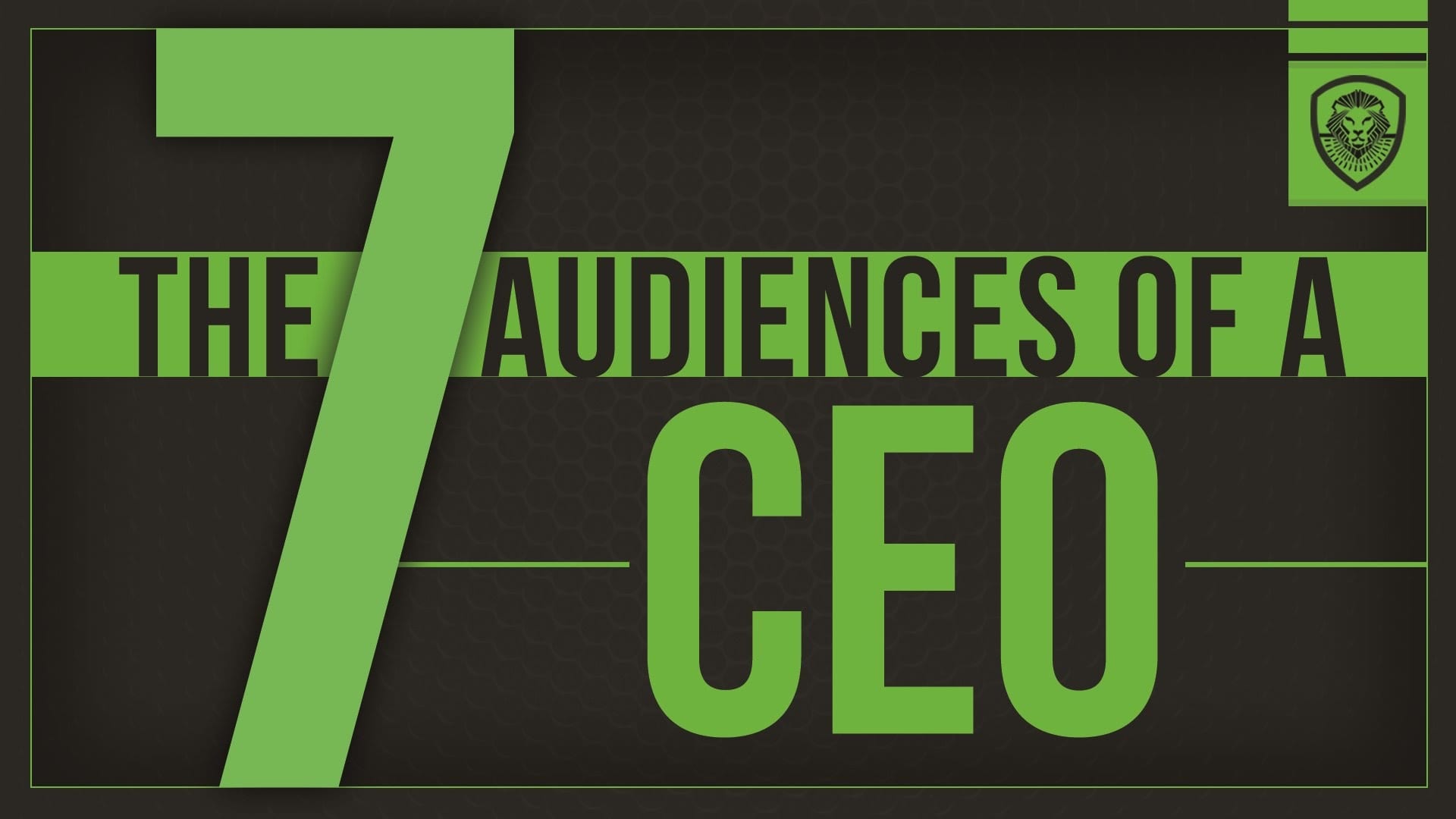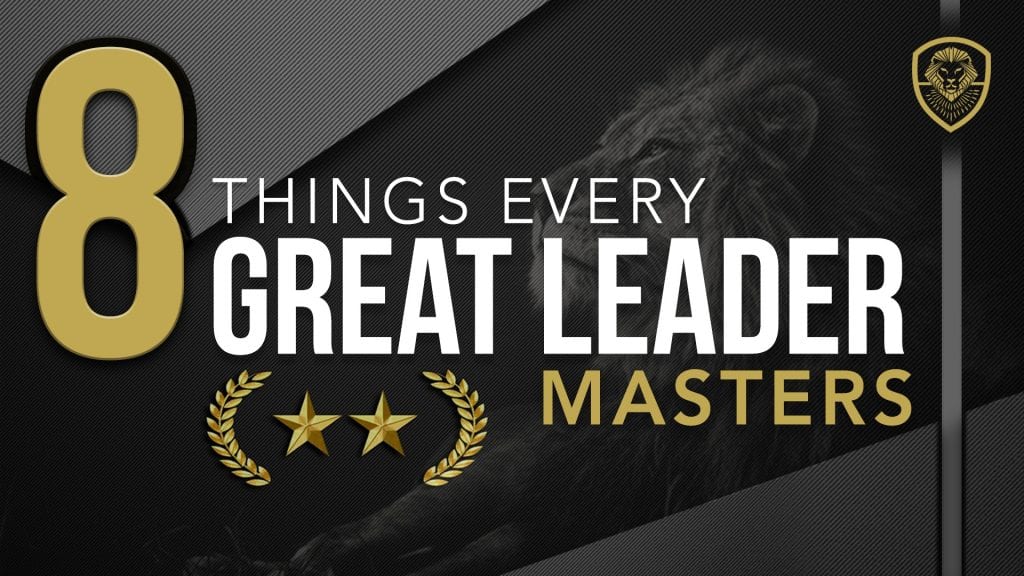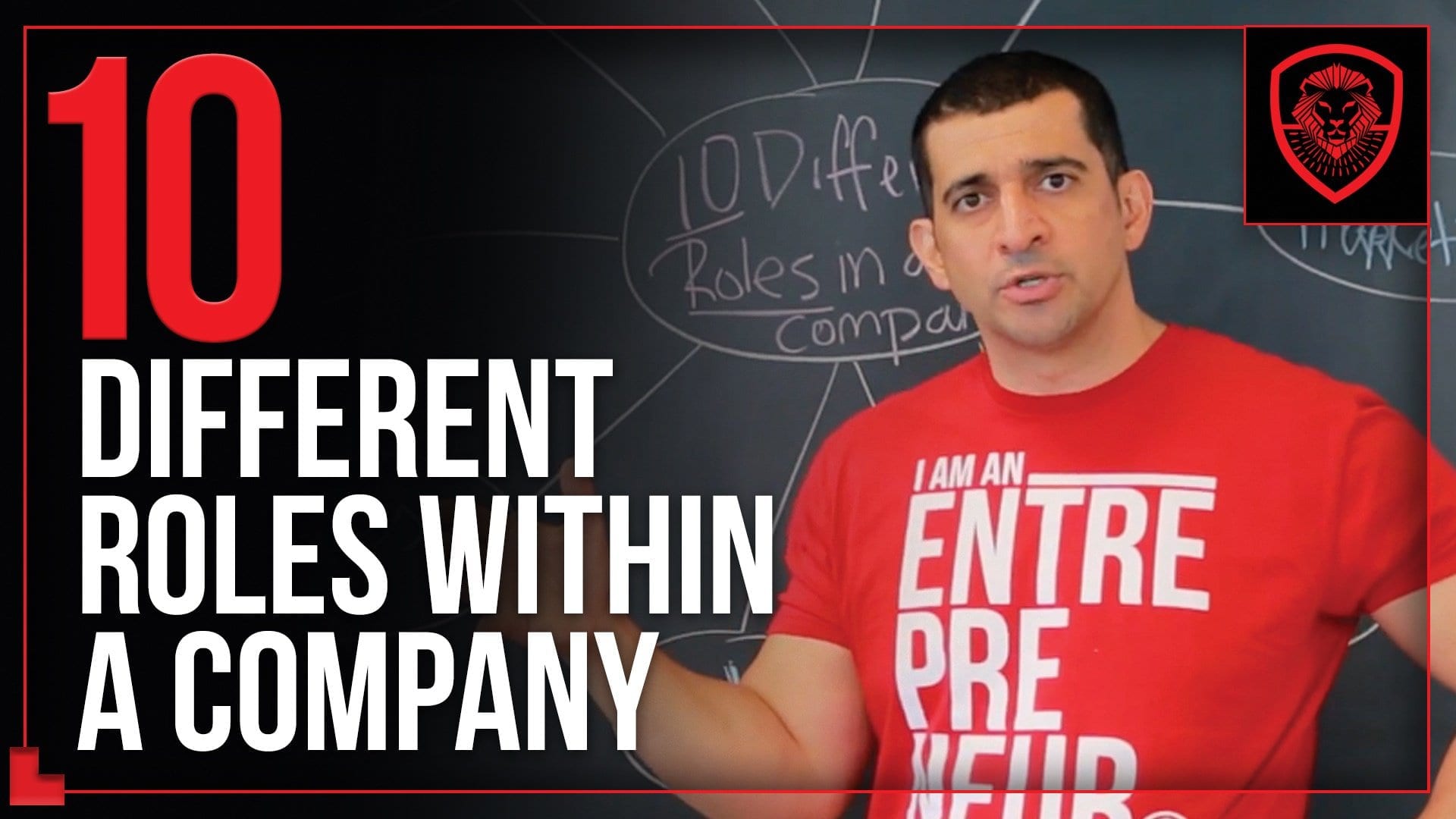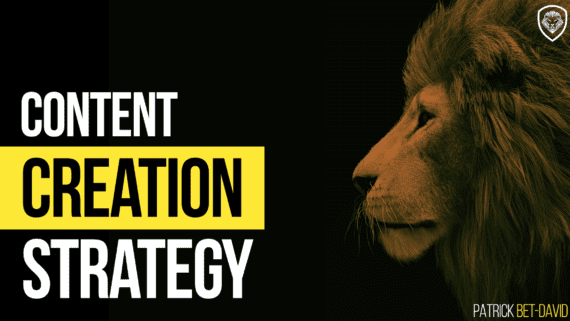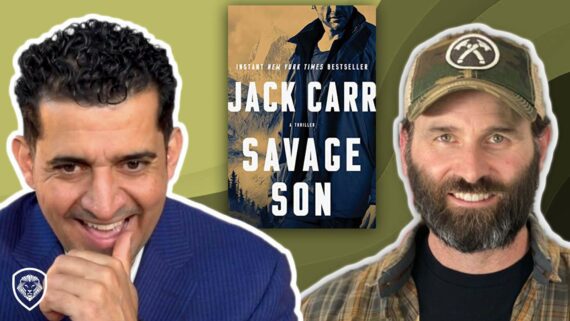One of the things I learned very early on as a CEO and entrepreneur was the fact that I cannot speak the same language to every audience. For instance, I can’t speak to my staff the way I speak to my vendors, and I don’t speak to vendors the way I speak to the media. There are seven audiences of a CEO and each audience requires a different communication style. Once you learn how to be aligned with the way you communicate with each audience, you become more effective.
[thrive_leads id=’7165′]
I’ve made all the mistakes in the world with this, and I’m probably going to make many more, but I finally developed a philosophy on how to communicate with the following seven audiences. I’ve ranked them in order from least important to most important in terms of communication.
#7: Media and Public
One of the challenges with media and the public that I experienced early on was when somebody endorsed me and all of a sudden, all of these different political media platforms started reaching out to me saying, “You know, this person’s on the back end, investing into the company.” We had no idea how to respond because we were just a startup. Our competitors loved the negative press we got, and we felt cornered. We had never gone through this before, and I had to learn how to not take things personally, and when not to defend ourselves.
One of the most important pieces of advice that I can give you when it comes to dealing with the media and public is to align your message with your identity.
Let me explain to you what I mean by that. The way that Donald Trump deals with media works for him. But if you tried to deal with media the way Donald Trump does, and it’s not your identity, you’re going to completely flop. You’ll make a fool out of yourself, and your brand.
Think about it this way. If I date a girl and for the first six months I act like a tough guy, the girl is attracted to the tough guy. A year later she may criticize my toughness, so I become a little softie. What happens then is that she loses her attraction to me. You may wonder why, but the reality is that the initial identity she was turned on by is no longer there.
Imagine Apple. Apple typically launches their new phones in September. If they don’t come out with a new phone in September, their identity is changes. They also have a specific way they launch. First it’s hush hush and then all of a sudden we hear news of the most incredible phone that will be coming out. They contact famous technology bloggers and give them hints, and 17 million people read the blog posts, where they read rumors of what the new phone will be like. When the new phone is released, people want to throw out their old phone or give it to their grandparents or parents, so they can go buy the new phone.
This style of launching is part of their identity. It works for them.
If you’re small right now, you may be thinking, “I don’t have to deal with this type of stuff.” But even when you’re small, you can be reviewed on sites like Yelp.
Also, when it comes to dealing with the media, if you did something wrong, always take responsibility for it. If you say, “It was our fault. We take full responsibility for this, we’re going to get better,” it disarms your attackers.
The main thing to remember is to make sure that your identity is congruent with who you really are.
#6: Vendors
The way I communicate with vendors is a completely different way than the way I communicate with partners. Here’s an example of a vendor. When I book an event at a hotel in Las Vegas, there’s a woman that represents us. She makes $25,000 on the deal. I’m on her case 24/7 to represent me in a world-class way. A vendor is someone I use every once in a while, but not on a monthly basis.
I put more pressure on vendors than anybody else. Why? Because anybody that’s a vendor with me for a long time, is automatically going to make a lot of money. And in my mind, a vendor is working from home, sitting there with their kids. They do all this other stuff as vendors and then they land a client like us and then automatically make $30,000 – $40,000 a year on one account. So if a vendor becomes too comfortable with me, I move on. The types of vendors that I keep for a very, very long time are the types of vendors that don’t abuse the relationship. They don’t automatically think that I’m a lock because they already have me and can use me and abuse me all the time. I don’t allow that to happen with vendors, ever.
We typically have multiple vendors to give us the best opportunity because if you only have one vendor, they will typically abuse you if they know they’re the only one. I don’t mean to be negative to vendors, I’ve just done a lot of stuff with vendors and I’ve had great vendors and I’ve had vendors that I had to fire.
There’s a guy that I’ve been using in Vegas for the longest time, Marshall. He’s absolutely phenomenal. He’s a pro. Every year he does my events. It doesn’t matter where I’m doing the event; I trust this guy’s feedback because of the way he does certain things. I value him. Now if all of a sudden he tries to abuse the relationship, obviously, we’ll go elsewhere, but I trust his abilities, as a vendor and what he does for us. I use him every single time we have an event. We even pick our dates based on his availability, because he’s a pro that we trust.
So a vendor’s relationship to me is pressure, performance, and high expectations.
#5: Investors
Investors have only one thing in mind, and that is how much money you’re going to bring back to them. That’s it. The only exceptions are people such as family members and long-term mentors who want to see you happy.
Outside of the people with a personal relationship with you, investors may care about your health, but it’s not on their top 10 list. The only reason they care about your health is for you not to die so they can get their money back. They care about your marriage, but the only reason they care about your marriage is because they don’t want your marriage to flop because a failed marriage will disrupt the business. Investors care about whether you’re happy or not, not because they care about your joy, happiness and all that other stuff, but because if you’re happy you’re going to perform and get better results, right? That’s how they think. So when you speak to investors, it’s all logic. When they ask things like, “How’s the wife doing? How’s the family doing?” all of that is small talk and they don’t care. Investors speak a completely different language. I like that language because it is a very honest language. It’s actually a very simple language. It’s not a complicated language. It’s purely a logical language you speak with investors. So the more you identify from that side, the more you’re able to communicate with them effectively.
#4: Customers
Listen in here for my thoughts on the language you use with customers.
#3: Partners
Listen in here for the role that partners play with customers and the rest of the team.
#2: Staff and Executives
Staff and executives generally are on a salary. Sales people are on a commission base. Staff and executive have benefits such as health insurance and a lot of other things that are taken care of. Their hours are pretty predictable for the most part.
I expect a lot from my executives. A lot from my executives. I’ll say it again — I expect a lot from my executives. If someone works closely with me and they’re an executive they will generally tell you, “Patrick is on our case until he trusts us.” And that’s literally the way it is. Once I trust your ability, that you have subscribed to being a leader in life, I leave you alone, and I simply challenge you and mentor you and then you give me direction and ideas. I first need to know that I trust you as a leader. Because of that, I push executives harder than anybody else to make them become a leader. The moment an executive becomes a leader, they lead my staff. So I need to make sure they become a leader so they will lead others by setting an example. So there are high expectations.
I’m doing a video that should launch in the next couple of weeks on the topic of six things I expect from my executives, so you’ll find out a little more about what I expect from them.
With my staff, I touch all of them and encourage them. I ask things like: How you doing? What’s going on? Keep it going. You’re playing an important role. We need to keep developing. We need to keep getting better, what is your project this week? What are you doing? What’s going on with this?”
We’re working that language as well, but there’s a high expectations from the executives for them to deliver and to perform. And I’m constantly teaching the executives and our staff members that no one’s more important without the sales force, without the customers. If we don’t take care of those two, we don’t have a job and we don’t exist. Staff understands that if the sales force is being taken care of and the customers are being taken care of, we have a job.
#1: Sales Force
And the last one which is the most important language you’ll speak to an audience is your sales force. I have meetings here with our staff that helps them understand the value of the sales force. A staff member may say, “Man, you know, I want to go home early and I want to go out there and do this and I want to go out there and do. . . ” And I say, “Listen, you’ve been going home early the last few weeks on Fridays. What do you think we are? Do you think we’re a $600 billion company? Do you think we’re corporate, going golfing on Friday, Saturday and Sunday? No, we’re not yet a $600 billion company, but we’re trying to be a $600 billion company. And you’re acting like you’ve already made it. That’s not a leader. It’s an entitled person. You want to golf? You go golf on Sunday. That’s totally fine with me. I don’t care if you want to golf. But we’re building something special here.”
In these times I will always remind our staff that sales people are in the streets getting rejected; they’re selling, they’re marketing, they’re knocking on doors, they’re going to homes. They’re constantly hearing the magical word, “N – O.” No, no, no, no, no. We have to be the biggest cheerleaders and make everything easier for the sales force.
I’m a driver with my sales guys but I also understand them because I’ve been selling all my life, so I know exactly what it is to go door to door. I know what it is to work from 6:00 in the morning to midnight, six, seven days a week. I know exactly what it is to work 100 hours per week. So I love working with my sales guys because if I make sure my sales guys are trained well, my customers are happy.
If I teach my sales guys to have high expectations and a bigger vision and think big on what they can do and make more money, that means we can expand the company and hire more people to give them more support. If we get our sales guys to work on becoming leaders and becoming independent in leading their businesses, reading books, developing themselves all around, they grow and everybody else in the company grows.
To me, at the top of my list are sales people because if customers are not happy and I’m on the phone with them for one hour, they’re typically complaining about who? Two people. They typically complain about the partner that didn’t give them the service with the product that was sold to them by who? A sales person that didn’t give them the type of results that they want.
I have to make sure that my sales reps treat my customers right. That’s why I put them at the top of my list.
More to Come
I spent a little over 20 minutes talking on this topic, but I could easily talk about it for eight hours. In the future we’ll go deeper in this area in a project that we’ll be releasing soon. In the meantime, I just want to put this in the back of your mind when you’re thinking about how to communicate with people. Let some of these ideas help you in communicating with these different audiences, whether it’s the public, vendors, investors, customers, partners, staff and executives, and sales people. You’ll do better with them if you learn how to communicate with their language.
We Need Your Help
Hey, guys, we’ve got to get to 100,000 subscribers on our YouTube channel, which I believe is the number one channel for entrepreneurs. I really believe that. I’ve sized up my competition and looked at exactly what type of content they put together. I believe this is the number one channel on YouTube for entrepreneurs that want to learn how-to principles. There are a lot of great channels that create incredible content that motivates entrepreneurs. But outside of our channel, there isn’t a lot of how-to information for entrepreneurs. And we need your help to get to 100,000 subs. I’m launching a big international project in August, so we need your help to get us to 100,000 subs by August 31.
So if you haven’t subscribed to our channel, click on the button below to subscribe. And if you have any questions and comments about this topic, which I’m sure you will, post your comments on the bottom.
[button content=”Subscribe to my YouTube channel” color=”red” text=”white” url=”http://www.youtube.com/subscription_center?add_user=patrickbetdavid” openin=”_blank”]

